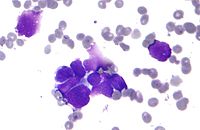
Photo from wikipedia
OBJECTIVE Evidence is limited regarding outcome of patients with ectopic Cushing's syndrome (ECS) due to neuroendocrine tumors (NETs). DESIGN We assessed the prognostic factors affecting the survival of patients with… Click to show full abstract
OBJECTIVE Evidence is limited regarding outcome of patients with ectopic Cushing's syndrome (ECS) due to neuroendocrine tumors (NETs). DESIGN We assessed the prognostic factors affecting the survival of patients with NETs and ECS. METHODS Retrospective analysis of clinicopathological features, severity of hormonal syndrome, treatments from a large cohort of patients with NETs and ECS collected from 17 Italian centers. RESULTS Our series included 110 patients, 58.2% female, with mean (±s.d.) age at diagnosis of 49.5 ± 15.9 years. The main sources of ectopic ACTH were bronchial carcinoids (BC) (40.9%), occult tumors (22.7%) and pancreatic (p)NETs (15.5%). Curative surgery was performed in 56.7% (70.2% of BC, 11% of pNETs). Overall survival was significantly higher in BC compared with pNETs and occult tumors (P = 0.033) and in G1-NETs compared with G2 and G3 (P = 0.007). Negative predictive factors for survival were severity of hypercortisolism (P < 0.02), hypokalemia (P = 0.001), diabetes mellitus (P = 0.0146) and distant metastases (P < 0.001). Improved survival was observed in patients who underwent NET removal (P < 0.001). Adrenalectomy improved short-term survival. CONCLUSIONS Multiple factors affect prognosis of ECS patients: type of NET, grading, distant metastases, severity of hypercortisolism, hypokalemia and diabetes mellitus. BCs have the highest curative surgical rate and better survival compared with occult tumors and pNETs. Hypercortisolism plays a primary role in affecting outcome and quality of life; therefore, prompt and vigorous treatment of hormonal excess by NET surgery and medical therapy should be a key therapeutic goal. In refractory cases, adrenalectomy should be considered as it affects outcome positively at least in the first 2 years.
Journal Title: European journal of endocrinology
Year Published: 2017
Link to full text (if available)
Share on Social Media: Sign Up to like & get
recommendations!